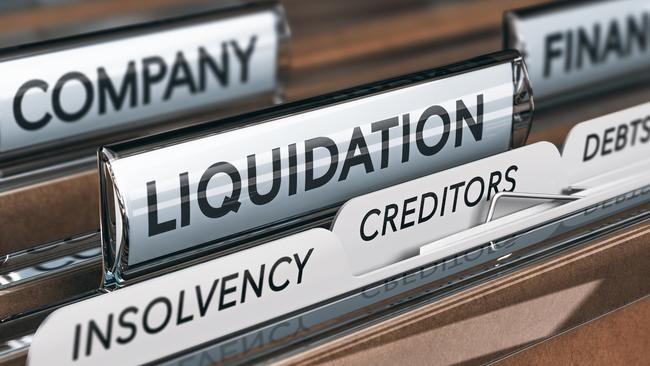Accountants left on the sidelines

It was the Harmer report in 1988 which led to the introduction of the voluntary administration framework.
On Monday, The Australian tapped into a rich vein of anger when it broke the story that the Morrison government is examining changes that could incorporate some elements of the Chapter 11 bankruptcy regime in the US, such as debtor in possession arrangements.
The objective is to simplify and expedite the insolvency process for small and medium-sized businesses by keeping management in place to facilitate a restructure.
The timing is deliberate — Deloitte Access Economics estimated last month that about 240,000 firms, or nearly 10 per cent of the nation’s companies, were at high risk of failure after September when they receive their last JobKeeper payments.
Another factor driving the reforms is the expiry, also in September, of the COVID-19 “safe harbour” protection for directors against insolvent trading for debts incurred in the ordinary course of business.
There’s a lot of critical decisions being made on the run in Canberra at the moment, which is no surprise because the coronavirus itself is setting a cracking pace.
At some point, though, it makes sense to take soundings from the experts instead of wrapping the entire process in secrecy.
Some interested parties believe that the best they can hope for in the current environment is a two-week window of consultation. Normally they’d expect four to six weeks for such significant reforms.
Organisations such as ARITA, or Australian Restructuring Insolvency and Turnaround Association, and accounting professional body CPA Australia will inevitably be accused of talking their books because they represent the status quo.
ARITA chief executive John Winter acknowledged on Tuesday that Australia lacks the kind of vibrant business-rescue culture which exists in the US.
The debtor in possession model, however, was all about leaving management in charge of businesses, which they had led into financial trouble, so that debts owed to creditors could be wiped or reduced. This would allow management to “do it all over again”.
“It’s just not something that Australian society is accepting of,” Winter said. “It’s also troublesome that people think wiping out what creditors are owed is in some way victimless.
“Those creditors are going to be other businesses, generally SMEs, or it’s going to be employees, subbies and tradies who don’t get paid.”
While Chapter 11 worked for big businesses, the regime was too expensive for the small businesses sector because of the high level of oversight it required.
A better solution was cutting the “pointless” red tape around small insolvencies, reducing their cost and complexity.
Unsurprisingly, CPA Australia agreed.
Policy adviser John Purcell said, if properly resourced, the existing structures around insolvent trading such as voluntary administration and safe harbour arrangements could be adequate to meet a crisis caused by the expected large number of insolvencies.
But a Chapter 11 approach risked artificially prolonging the life of a business and tying up assets that could be more efficiently deployed elsewhere. There was also a risk that individuals responsible for the corporate failure would not be held accountable for personal wrongdoing.
The eagle has landed
NAB and Rio Tinto director Simon McKeon has one less source of aggravation in his life, and it’s nothing to do with the Rio board completing its review of the Juukan Gorge debacle.
It has even less to do with AMP, where McKeon was chairman until he skipped out the front door in 2016 due to a “change in my circumstances”. If there’s a better example of dodging a bullet in corporate life, this column is keen to hear about it.
McKeon’s latest escape from the trenches is a cessation of Federal Court hostilities with rival shareholders in the Arthurs Seat chairlift on the Victorian coast.
The chairlift, which offers panoramic views up the coast to Melbourne and beyond, has become a private passion for the former Macquarie dealmaker.
McKeon told this newspaper in June that his parents bought a holiday house near the base station in Dromana, where he and his mates used to sneak free rides and jump off 50 metres before the pay station at the top.
Fatefully, when the chairlift was closed in 2006 due to a series of accidents, he decided to get involved.
Four shareholders, including McKeon, his billionaire logistics mate Peter Gunn and two minority investors, ploughed $20m into an upgrade, enabling the operation to reopen in 2016.
To cut a long story short, COVID-19 restrictions and bushfire haze forced the operating company, Arthurs Seat Eagle, into administration earlier this year.
When the administrators backed a McKeon-Gunn deed of company arrangement, the minorities — former chief executive Hans Brugman and local real estate agent Robin Waterbury — took legal action.
Brugman and Waterbury said they were owed $4.3m due to written undertakings by their adversaries to provide financial support to Arthurs Seat Eagle. McKeon and Gunn said this was nonsense.
In an affirmation that world peace is possible, the case was settled in the last few days.
A cheery McKeon said he couldn’t comment, as did Arnold Bloch Leibler consultant Jane Sheridan on behalf of Brugman and Waterbury.
gluyasr@theaustralian.com.au Twitter: @Gluyasr







The insolvency industry is coming to grips with the fact that it’s been completely sidelined from the biggest ticket of industry reforms since the 1980s.